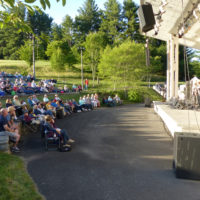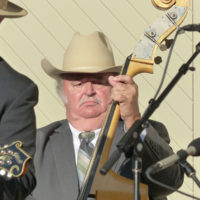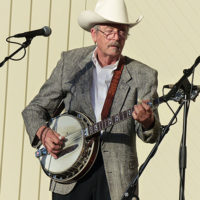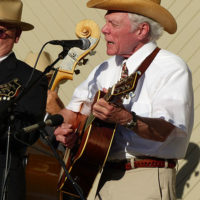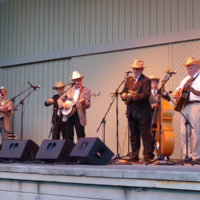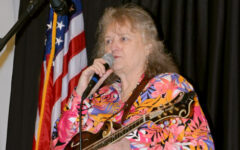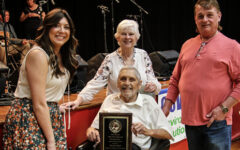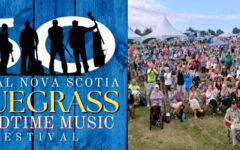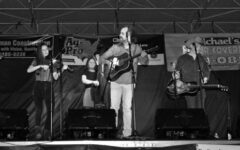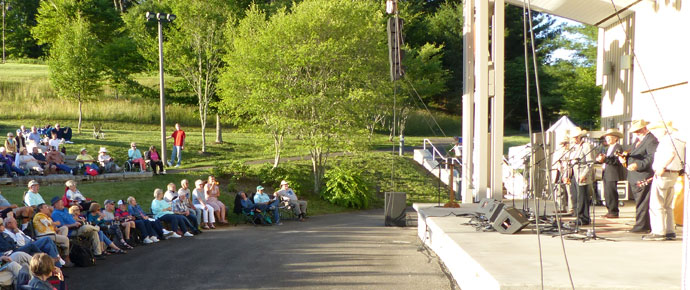
According to Tom Ewing, author of Bill Monroe: The Life and Music of the Blue Grass Man and guitarist for his Blue Grass Boys the last ten years that Monroe performed, the father of bluegrass music had 149 various band members throughout his career. This past weekend, five of those musicians banded together (with Nashville Bluegrass Band’s Mike Compton on mandolin) to perform as Bill Monroe’s Sons of Bluegrass.
The unique and historic event celebrating the legacy of Bill Monroe through the music of some of his sidemen was the brainchild of Crooked Road Executive Director, Jack Hinselwood. The Crooked Road covers 19 counties, four cities, and over 50 towns and communities in southwestern Virginia where heritage music is celebrated year-round. Nine major venues, over 60 affiliated venues and festivals, and over 25 wayside exhibits offer many opportunities for visitors to experience one of the richest music traditions in the world.
Upon contacting southwestern Virginia’s former Blue Grass Boys, Butch Robins and Doug Hutchens, a collaboration between musicians formed and Hinselwood’s idea came into fruition. Joining Ewing and Compton were: Robins on banjo, Hutchens on bass, and Billy Baker and Robert Bowlin on fiddles. All had performed with Monroe at different times throughout his career.
Two performances thus ensued. As part of Crooked Road’s Mountains of Music Homecoming, the ensemble performed Friday night at the Blue Ridge Music Center’s amphitheater, located on the Blue Ridge Parkway near Galax, VA. On Saturday, Monroe’s former band members entertained at the Harvester Performance Center in Rocky Mount, VA.
Dr. Ted Olson, American Roots Instructor with East Tennessee State University, was on hand Friday night to introduce the 200 plus attendees to Bill Monroe’s Sons of Bluegrass. Donning their Blue Grass Boy hats, the sextet took the stage, playing songs that they had performed during their tenures with Monroe. Foot Prints in the Snow, Blue Moon of Kentucky, Can’t You Hear Me Calling,and Uncle Pen were familiar favorites that audience members requested, and the band complied during the two hour concert.
Prior to Friday night’s show, Ewing gave a presentation on Bill Monroe based on his personal experiences as a Blue Grass Boy, and the research he collected for his 2018 book, which spans 104 years of musical history. (Starting with Monroe’s parents’ wedding on August 3, 1892 and concluding with his death on September 9, 1996.)
“I caught him at the tail end of a 65 year career. He was a genius,” Ewing shared with those gathered in the Music Center’s indoor theater. “Compiling information for my book, I talked to 80 or so Blue Grass Boys.”
Following Ewing, Robins discussed his time as Monroe’s banjoist. “Eveyone has their own take on him. I picked with Monroe from 1977-1981, the most exhilarating time in my life. I was standing at his right hand the last time my dad saw Monroe perform.”
“He taught me in little ways. I once asked him about a song that he had written. He said, ‘I never wrote a tune in my life. That music’s all in the air. I just happened to be the first to pull it out.’ Monroe was all about the music.”
Baker, Bowlin, and Hutchens then shared their own Monroe stories.
Baker recalled a funny episode on the Blue Grass Boys’ way home from a show in Florida. “Del McCoury was driving and got sleepy, so I started driving. I came up on a series of signs warning of a barricade ahead. It was then I discovered the brakes didn’t work. I finally hit a hole and throwed Bill out of the bed. He asked Del, ‘Does he know how to drive a bus?’ But he never said a word to me.”
Bowlin was Monroe’s fiddler the last 3 1/2 years of the band. “I first played the Grand Ole Opry and then for Bill Clinton’s inauguration. I had no idea how much I would really learn. I became a much better fiddle player.”
Hutchens, initally a banjo-picker, came to Monroe’s Bean Blossom festival in 1970. Recruited by Robins’ dad, the eighteen-year-old Viriginian helped prepare the grounds for the musical event. Afterward, Monroe invited Hutchens to travel with the band and pick a tune on stage. The banjoist recalled how he learned to play one song on the bass while Joe Stuart would twin fiddle. In Lancaster, PA, Hutchens instantly became a Blue Grass Boy. After his one song, Monroe insisted that Hutchens stay on stage and play bass for the remainder of the set with band. New to the instrument, band members helped him with keys, chords, and neck positions.
“I got blisters on all four fingers on both hands,” Hutchens stated.
Richard Emmett, program director for the Blue Ridge Music Center, stated that “We are happy to host this concert, Mountains of Music, and serve as a major venue with Crooked Road and partner with friends of southwest Virginia. They are incredible musicians.”
Three of the performers are published authors. In addition to Ewing, Robins penned his autobiography, What I Know ‘Bout What I Know, and Hutchens compiled Stories of Bill Monroe and the Blue Grass Boys by the men who wore the hats, entitled Howdy, Folks, Howdy. Both were copyrighted in 2003. All publications are available from the artists.

